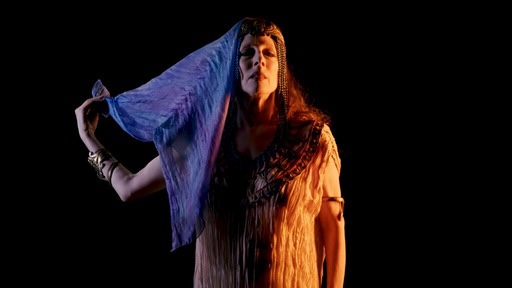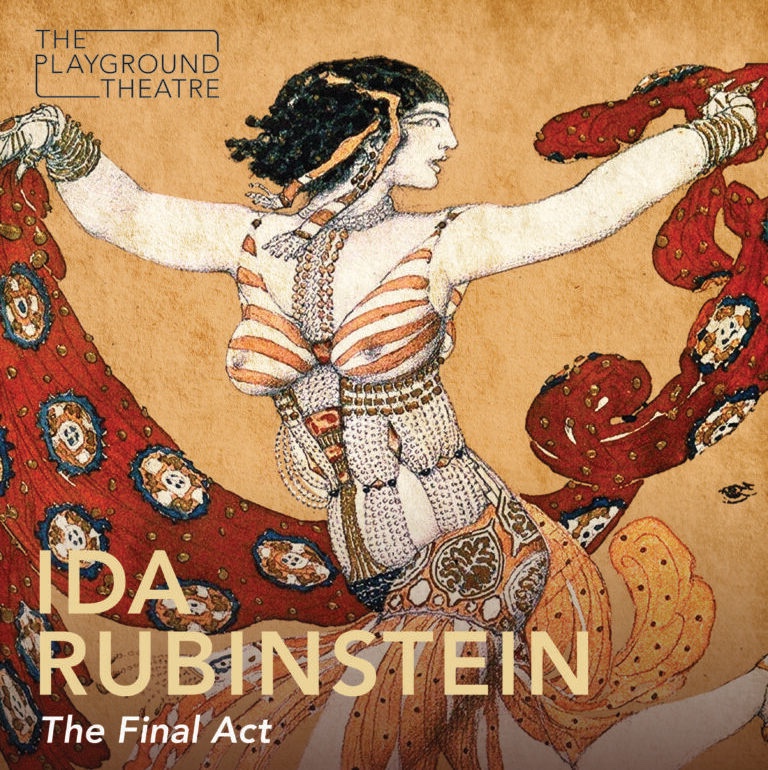Words by Stella Rousham.
‘The Ballets Russes’, ‘Nijinsky’, and ‘Diaghilev’ are all names that those with passions for ballet and dance history will be well aware of. ‘Ida Rubinstein’ – perhaps less so. The Western amnesia of the life and work of Rubinstein is at the heart of Ida Rubinstein: The Final Act, the latest play to be performed at The Playground Theatre, London this autumn. I had the privilege to discuss the importance and meaning of this new work with Naomi Sorkin, American Ballet Theater principal-turned-freelance artist, who will be playing the eponymous character. Naomi reflects on her affinity with Ida and her ambition to share her story through this highly theatrical, interdisciplinary production.
Stella: Hi Naomi! Would you be able to explain what the show is about?
Naomi: The play follows the extraordinary life story of Ida Rubinstein. The thing that’s absurd is that Ida Rubinstein is a name that is not known in the West. It’s amazing that her name is not known, because she was staring opposite Nijinsky in the two premiere seasons of the Ballet Russes in Paris. These were seminal seasons in the 20th century ballet history. These seasons had a great impact on everything – on life, fashion, art, choreography and dance.
Historically, everybody knows about the Ballets Russes, but they do not know the name Ida Rubinstein. She was not a dancer in the true sense of the word. She came to it late at the age of 19 and started studying with choreographer Mikhail Fokin. Yet, Fokin recognised her incredible charisma, plasticity and ability to communicate something very different than regular ballerinas from the Mariinsky company.
In our show, through the lens of a journalist’s interview, we are able to go back into Ida’s whole history and the principal people in her life. She had a mysterious and private life, which gives us a certain amount of artistic licence. There are a lot of facts about her life — what she produced, what she performed in — but there’s very little actual documentation about her persona.
Stella: How has it felt to perform Ida? Do you feel any affinity with her or it is quite hard to embody her as a character?
Naomi: I feel very at home with Ida. It’s a role that I feel at home in. I am of Russian-Jewish heritage and it was suggested to me, by the man who founded American Dance Magazine, that I play Ida. He had researched an article on her and said to me: ‘You must play her’.
Stella: What have you based the characterisation on? Have used an images or footage?
Naomi: There is footage of her. She did one film in the 1920s. There are also lot of images of Ida, and of course I have studied them, but I’m not specifically basing my performance directly on an image that exists. I actually played Ida in a short film ten years ago, which was a very interesting work that I’m very proud of.
The writer of the film took a very interesting and different slant to the playwright. But it didn’t really tell her life story. The play started to come together a good eight years later. A wonderful vocal teacher, who I and Christian Holder (the writer of the play) have both worked with, Philip Foster, is very keen to support mature women artists. He said there just aren’t the roles for mature women and it’s not right. Philip kept saying how there definitely should be something for me. In a way, he kind of opened the door again to my thinking about doing Ida in a fuller way.
Stella: What was it like to work with playwright Christian Holder? You mentioned that in the past you were both based at similar ballet companies, so have you worked together previously?
Naomi: As performers we did one great piece together years ago. We’ve very much created the character of Ida together. We both understand the period so completely, it is part of our DNA and our background. We’ve both worked with members of Ballets Russes in the States, so it’s home territory for us. That’s why I think Christian was absolutely the right person to write it, because I think somebody who didn’t have that personal history would never understand the period in the same way. Christian and I actually previously worked on a solo that was based on references from Ida’s life. It’s not in the play, but it was a beautiful solo. From this experience, we knew we could really create together.
Stella: It sounds just brilliant bringing all of these people together. Uncovering this lost figure and forgotten history is striking and intriguing. Why do you think it is so important to tell Ida’s story to audiences?
Naomi: Ida was a woman in the early 20th century who refused to be inhibited – and there were extraordinary obstacles in her way. Her will and determination to become an artist was so strong that nothing could stop her.
Ida Rubinstein acted, she commissioned Maurice Ravel’s Boléro! Ida’s principal choreographer was Njinsky. She gave Frederick Ashton his first job. All these major figures and seminal pieces of music wouldn’t have existed without her. I think, had a man done of all this, it would be well-known history. Ida has never been given credit for being an impresario who created a significant body of work.

Stella: When women are documented in history, it’s often in a single role as a performer, an actress or a singer. It doesn’t show the extent of the change they made, the impact they had and their role in organising and leading a discipline.
Naomi: That is why it is important to tell these women’s stories. Too few women are documented for the extraordinary things they have done. As we know, it is still a struggle. Women are still not really recognised and it’s 110 years later.
However, I’m not denying the fact that Ida’s wealth gave her the capacity to do things. But, there are a lot of wealthy people who don’t do anything for anybody. We don’t shy away from her failings, but we also make it very clear what her contributions were.
Stella: I feel like so many biographies or retrospectives of artists or performers wouldn’t perhaps acknowledge the privilege or wider context of why certain individuals were able to achieve such things. I think that it’s important to really show any artist or performer as a full person. A person who is flawed but also made great work, changes and contributions. I really appreciate the way that you have framed this.
Naomi: She was outrageous too. We don’t specifically highlight this, but she posed nude for several paintings which at the time in 1909 was fairly radical. Ultimately, she was a complex character.
Stella: Do you think that some of the more outrageous or radical things that she did has contributed to the fact that she has been forgotten to history? Do you think people have had interests in suppressing her story?
Naomi: From my perspective, her fatal failing that contributed to her being forgotten was when she created her company. She insisted that she be centre of every single piece of work, but she wasn’t really up to it. In her mid-forties, for instance, she went en pointe — but she wasn’t a classically trained dancer! I think what happened was that she received a certain amount of ridicule and so people kind of dismissed her in that way.
Stella: Would you like to take this play further? Where do you see it going?
Naomi: We (Christian and I) would both love to take it to New York, because both of us are the most well known there. I’d also love to take it to Saint Petersburg. I’d love to take it anywhere else that is a receptive to this kind of work!
Stella: Is there anything else you would like to share with our readers about the show?
Naomi: As a dancer I had a lot of work created on me, but this is the fullest, biggest work and I’m excited to share what we hope will give a very complete experience. The show is multi-media — it has music, dialogue, and projections. There’s also movement evoking things from the past, from Ballets Russes and Scheherazade, for instance. Our aim is to tell this wonderful woman’s life and my objective as an artist has always been to move people.

Naomi Sorkin will be starring as Ida in Ida Rubinstein: The Final Act, at The Playground Theatre, London from September 23rd — October 16th 2021. If you are keen to learn more about Naomi and her rich artistic career, please visit her website: https://www.naomisorkin.com/.
For information on the play and to book tickets please visit the Playground Theatre website: https://theplaygroundtheatre.london/events/ida-rubinstein-the-final-act.Or call the box office at 0208 960 0110.
Header image: Gail Hadani